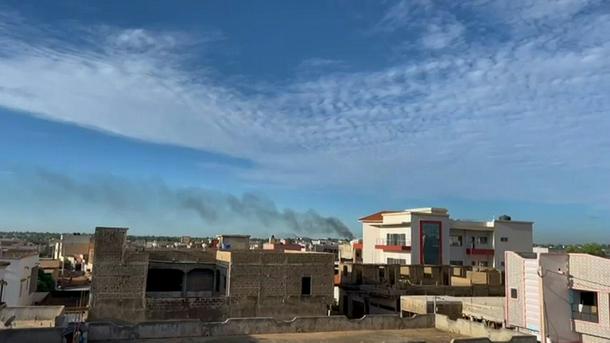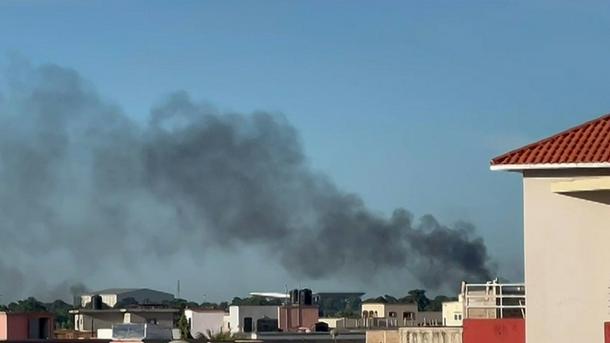
Mali's army said 'terrorists' had attempted to infiltrate a military police base in the capital
Bamako (AFP) - An Al-Qaeda-linked jihadist group on Tuesday claimed responsibility for an attack in Mali’s capital Bamako, the first such operation in years which saw them temporarily take control of part of the international airport.
Images broadcast on the communication channels of the Jama’at Nusrat al-Islam wal Muslimeen (JNIM) group showed fighters strolling around and firing randomly into the windows of the presidential hangar in the airport complex.
The space usually hosts official guests and the head of state of the West African country, which has been under military rule since coups in 2020 and 2021.
One video showed a fighter calmly firing at the engine of an aircraft, while in others thick smoke could be seen rising from the airport and the hangar of the presidential plane.
Details about the surprise attack were scarce throughout the day, after volleys of gunfire interspersed with explosions began at around 5:00 am (local and GMT).
JNIM said on its communication channels that a “special operation” targeted “the military airport and the training centre of the Malian gendarmes in the centre of the Malian capital” at dawn.
It said the attack caused “huge human and material losses and the destruction of several military aircraft”.
Authorities have not announced any official toll.
Unverified videos circulating on social media showed charred bodies on the ground.
Bamako is normally spared the sort of attacks that occur almost daily in some parts of the West African country.
In 2016, gunmen attacked a Bamako hotel housing the former European training mission of the Malian army, with no casualties reported among the mission staff.
- Heavy exchanges of fire -
With the flow of information restricted under the ruling junta, details on how Tuesday’s attack was carried out and its results are sketchy.
Heavy exchanges of fire took place early afternoon near the police station controlling access to the civilian airport terminal, security and airport officials told AFP on condition of anonymity.
The firing seemed to have stopped by mid-afternoon, an AFP correspondent said.
Earlier, Mali’s army said the situation was “under control” after what it called a foiled infiltration attempt by “terrorists” into a military police base.
The junta-led authorities generally use the term “terrorists” to describe jihadists and separatists in the north of the country.
“The terrorists have been neutralised. The sweep is continuing,” the army’s chief of staff, General Oumar Diarra, said on state television.
Images broadcast by the public TV channel showed around 20 blindfolded prisoners, sat on the floor with their hands tied.
The army urged the population to remain calm.
Diarra spoke only of “slightly complex infiltration attempts” at the training centre, with no mention of the claimed assault on the military airport.
The police training camp is a few minutes from the airport district, where the military facility neighbours the civilian one.
The transport ministry said in a statement that access to the airport was “temporarily restricted in order to prevent any risks”.
The French high school, Liberte, announced it would remain closed “due to external events”.
Staff at the United Nations mission in Mali received a message saying: “Gunshots heard in parts of Bamako. All UN personnel are to restrict movements until further notice.”
- Regional unrest -
Poor and landlocked Mali has since 2012 been ravaged by different factions affiliated to Al-Qaeda and the Islamic State group, as well as by self-declared defence forces and bandits.
The violence has spilt over into neighbouring Burkina Faso and Niger.
Mali has been ruled by a military junta since back-to-back coups in 2020 and 2021.
Under junta leader Colonel Assimi Goita, Mali broke a long-standing alliance with European partners and former colonial power France, turning instead to Russia and its Wagner mercenary group for support.
The military government last year also ordered the withdrawal of the UN stabilisation mission, MINUSMA, and in January ended a 2015 peace agreement with separatist groups in the north.

An Al-Qaeda-linked jihadist group claimed responsibility for the attack
Mali, Burkina Faso and Niger – the latter two also now under military leadership – formed their own Sahel alliance a year ago and all pledged to leave regional bloc, ECOWAS.
The worsening security situation in Mali has been compounded by a humanitarian and economic crisis.
The military leaders have pledged to regain control of the entire country.